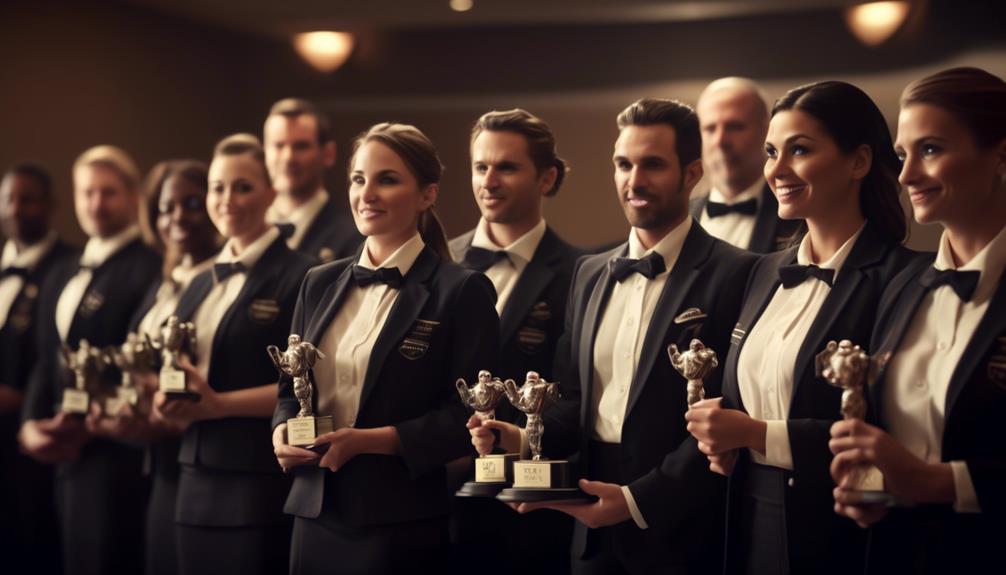Hospitality Leadership: Inspiring and Motivating Your Team
As a hospitality leader, you know that leading a team is like conducting an orchestra, where each instrument plays a crucial part in creating a harmonious symphony.
However, inspiring and motivating your team goes beyond just orchestrating their actions; it involves understanding their individual strengths, nurturing their growth, and fostering a collaborative environment.
By mastering the art of hospitality leadership, you can elevate your team's performance to new heights, create a positive work culture, and achieve outstanding results.
But how exactly can you achieve this?
Key Takeaways
- Recognize the strengths and weaknesses of team members
- Adapt leadership approach based on the situation
- Provide positive reinforcement and acknowledge hard work
- Empower team members to take initiative and contribute ideas
Understanding the Role of a Hospitality Leader
As a hospitality leader, your role is to inspire and motivate your team to deliver exceptional service that exceeds guests' expectations. Understanding the dynamics of your team and implementing effective leadership styles are crucial for achieving this. Different leadership styles can be utilized based on the situation and the individuals within your team. By recognizing the strengths and weaknesses of your team members, you can adapt your leadership approach to maximize team motivation and productivity.
Team dynamics play a significant role in staff engagement. Creating a positive and inclusive work environment fosters strong team dynamics, leading to increased staff engagement. Encouraging open communication, collaboration, and mutual respect among team members can significantly impact their motivation and engagement levels. As a leader, your ability to understand and leverage these team dynamics can greatly influence the overall success of your team.
Fostering a Positive Work Environment
Creating a positive work environment is essential for fostering team motivation and productivity. It all begins with positive reinforcement. Acknowledge your team's hard work and efforts. A simple 'thank you' or 'great job' can go a long way in boosting morale and showing appreciation.
Employee engagement is another crucial aspect. Encourage open communication and active participation. Make your team feel heard and valued by seeking their input on important decisions and actively listening to their ideas and concerns.
Foster a culture of collaboration and support, where everyone feels empowered to contribute to the team's success. Lead by example by demonstrating a positive attitude and a willingness to roll up your sleeves and work alongside your team. Show genuine care for your team members' well-being and work-life balance.
Build trust through transparency and fairness in your leadership. By prioritizing a positive work environment, you create a space where your team feels motivated, supported, and inspired to give their best.
Empowering and Developing Team Members

To further elevate your team's motivation and productivity, focus on empowering and developing each team member to their fullest potential. Empowerment is crucial for fostering a sense of ownership and accountability among your team. Encourage open communication and decision-making, allowing team members to take initiative and contribute ideas. Provide growth opportunities by offering training programs, mentorship, and chances to lead projects. This not only enhances their skills but also shows that you're invested in their development.
Team development is a continuous process that requires a strategic approach. Identify individual strengths and areas for improvement, and tailor development plans accordingly. This could involve cross-training, job rotations, or special assignments that challenge and expand their abilities. Regular feedback and coaching sessions are also vital in guiding their progress. By investing in their skill building and professional growth, you not only strengthen the capabilities of your team but also increase their job satisfaction and loyalty.
Effective Communication Strategies
Hey there, as a hospitality leader, effective communication is key to inspiring and motivating your team.
Clear and concise messages and active listening techniques are essential for fostering an environment of understanding and trust.
Clear and Concise Messages
Inspire your team through clear and concise messages, fostering effective communication strategies that drive motivation and productivity. When it comes to leadership communication and team motivation, the way you convey your messages holds immense power.
Here's how you can ensure your messages are impactful:
- Clarity: Be crystal clear in your message to avoid any confusion or misinterpretation.
- Brevity: Keep your messages concise and to the point, respecting your team's time and attention.
- Relevance: Ensure that your messages are relevant to your team's goals and tasks, keeping them engaged and motivated.
Active Listening Techniques
Fostering effective communication strategies, including active listening techniques, is crucial for inspiring and motivating your team in the hospitality leadership role. Active listening involves fully concentrating, understanding, responding, and remembering what is being said. By actively listening to your team members, you demonstrate empathy and create an environment where they feel valued and understood. This fosters trust and encourages open communication, which is vital for team motivation. Utilize active listening as a tool for conflict resolution as well. To help you visualize the key components of active listening, here's a simple breakdown:
| Active Listening Techniques |
|---|
| Concentrate |
| Understand |
| Respond |
Incorporating active listening into your leadership style will not only enhance communication but also contribute to a more motivated and inspired team.
Encouraging Collaboration and Teamwork

Hey there!
Building trust and unity within your team is crucial for fostering a collaborative and supportive work environment. Encouraging open communication allows for ideas to flow freely and for team members to feel valued and heard.
It's also important to recognize and appreciate the unique contributions of each team member to reinforce a sense of belonging and teamwork.
Building Trust and Unity
By fostering a culture of openness and collaboration, you can build trust and unity within your team, creating an environment where everyone feels valued and motivated to work together towards common goals.
Trust building and team unity are crucial for a cohesive and high-performing team. Here's how you can achieve this:
- Open Communication: Encourage transparent and respectful communication to foster trust and understanding among team members.
- Shared Goals: Establish common goals that everyone can work towards, promoting a sense of unity and collective achievement.
- Team Building Activities: Organize team-building exercises and activities to strengthen relationships and promote a sense of unity and camaraderie.
Embracing these strategies won't only enhance trust and unity within your team but also contribute to a more collaborative and motivated work environment.
Fostering Open Communication
Building trust and unity within your team sets the foundation for fostering open communication, encouraging collaboration, and teamwork. Improving feedback channels is crucial for creating an environment where team members feel comfortable sharing their thoughts, ideas, and concerns. Actively seek out feedback from your team and promote a culture of constructive dialogue.
Enhancing transparency by openly sharing information about the organization's goals, challenges, and decisions helps foster a sense of belonging and trust among team members. Encourage open and honest communication by actively listening to your team, acknowledging their input, and addressing any issues that arise.
Recognizing and Valuing Contributions
Recognizing and valuing the contributions of your team members is essential for fostering collaboration and teamwork within your hospitality leadership role. Employee appreciation goes a long way in creating a positive work environment and motivating your team to excel.
Here's how you can effectively recognize and value contributions:
- Regular Recognition: Acknowledge and celebrate the achievements of your team members on a regular basis to show them that their hard work is valued.
- Personalized Appreciation: Take the time to understand each team member's unique contributions and recognize them in a personalized manner.
- Inclusive Recognition: Encourage a culture of peer-to-peer recognition where team members appreciate each other's contributions, fostering a sense of camaraderie and teamwork.
Recognizing and Rewarding Excellence

Regularly acknowledging and rewarding outstanding performance is vital for fostering a culture of excellence within your team. Employee recognition and incentive programs play a crucial role in motivating and inspiring your team to consistently deliver exceptional service. Implementing performance rewards and appreciation events not only acknowledges individual and team accomplishments but also encourages others to strive for excellence.
When recognizing excellence, it's essential to make it personal and meaningful. Tailoring rewards to each individual's preferences or offering a choice of incentives can demonstrate genuine appreciation for their hard work. Additionally, creating a culture of peer-to-peer recognition can further enhance team dynamics and motivation.
Incentive programs should align with your team's values and goals, reinforcing behaviors and outcomes that contribute to the overall success of your hospitality business. By consistently recognizing and rewarding excellence, you not only motivate your team but also cultivate a positive work environment where individuals feel valued and appreciated. This, in turn, boosts morale, productivity, and customer satisfaction.
Recognizing and rewarding excellence is an investment in your team's success and the overall guest experience.
Nurturing a Culture of Continuous Improvement
When fostering a culture of continuous improvement within your team, it's essential to build upon the foundation of excellence by encouraging ongoing learning and development. Continuous learning and team development are pivotal in nurturing a culture of continuous improvement. Here's how you can achieve this:
- Encourage Skill Enhancement: Provide opportunities for your team to attend workshops, seminars, and training sessions to enhance their skills. This not only benefits the individual but also contributes to the overall growth of the team.
- Promote Knowledge Sharing: Foster an environment where team members are encouraged to share their expertise and learn from one another. This can be achieved through regular team meetings, brainstorming sessions, and cross-training initiatives.
- Embrace Feedback Culture: Create a feedback loop where constructive criticism is welcomed, and employees are empowered to implement suggestions for improvement. This open communication fosters a culture of continuous growth and development.
Conclusion
You've learned the key elements of hospitality leadership, now it's time to put them into action.
Remember, 'Teamwork makes the dream work'. Keep inspiring and motivating your team, fostering a positive environment, and empowering each member to reach their full potential.
With effective communication, collaboration, and recognition, you'll nurture a culture of continuous improvement. Lead with heart and determination, and watch your team soar to new heights.
Good luck!







